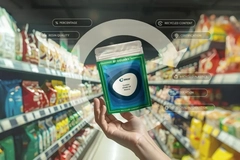Barracuda Maiden modular bio-refinery project launches in India for cosmetic and packaging applications

Barracuda Technologies launches its first modular bio-refinery project, Maiden Modular, in India, employing a proprietary biomass fractionation process to convert agricultural waste — including rice straw, wheat straw, banana stems, hemp and more — into valuable materials like clean lignin, cellulose, bio-silica and hemicellulose.
Speaking about the commercial applications of the company’s molded fiber products, Navin Singhania, CEO and founder of Barracuda Technologies, tells Personal Care Insights: “Our biodegradable packaging will also be very useful for the cosmetic industry.”
What differentiates Barracuda’s bio-refinery is its biomass-agnostic nature and near-zero liquid discharge, making it an environmentally friendly operation that effectively addresses waste management challenges. By transforming agricultural residues into high-value materials, Barracuda not only enhances resource efficiency but also helps mitigate issues such as stubble burning.

Applications
“Our pure and clean lignin is a much sought-after sustainable material for the cosmetics industry,” Singhania tells us. With its unique properties, including anti-charring, UV resistance and moisture resistance, clean lignin can be used in a variety of cosmetic formulations, such as anti-aging creams and UV-protection products. “Lignin will definitely replace a lot of oil-based ingredients in the cosmetics industry,” she says.
In addition to its cosmetic uses, lignin can be used in coatings, adhesives, thermoplastics and polyurethanes. Barracuda is working on making Bio-Bitumen from lignin.
Their bio-refinery also produces bio-silica, which is useful for the production of tires and certain food products. Bio-silica is also commonly used to improve the texture and effectiveness of personal care products. This natural silica can enhance the performance of face masks, scrubs and other cosmetics.
Cellulose innovations
Barracuda has had success using its cellulose in non-woven products including packaging paper, tableware, folding boxes and cardboard boxes, alongside the making of biofuels, Microfibrillated Cellulose and nanocellulose.
The company offers possible modulations in surface finish, strength and bio-based solutions for moisture resistance. Barracuda is currently working on innovating woven products, including mesh and yarns, which will also be useful for the packaging industry — for example the mesh bags fresh fruits and vegetables are commonly sold in.
Supply chain efficiency
Barracuda’s bio-refinery features a modular design, which alleviates the logistical challenges often associated with sourcing low-density feedstocks. This approach facilitates a hub-and-spoke model that enhances supply chain efficiency, making it easier for cosmetic manufacturers to obtain sustainable ingredients.
“Modular bio-refinery changes the entire scenario on long-standing bottlenecks concerning supply chain and logistical issues associated with low-density feedstocks and capital expenditures. The Barracuda process is very low cost, clean and circular,” Singhania says.












